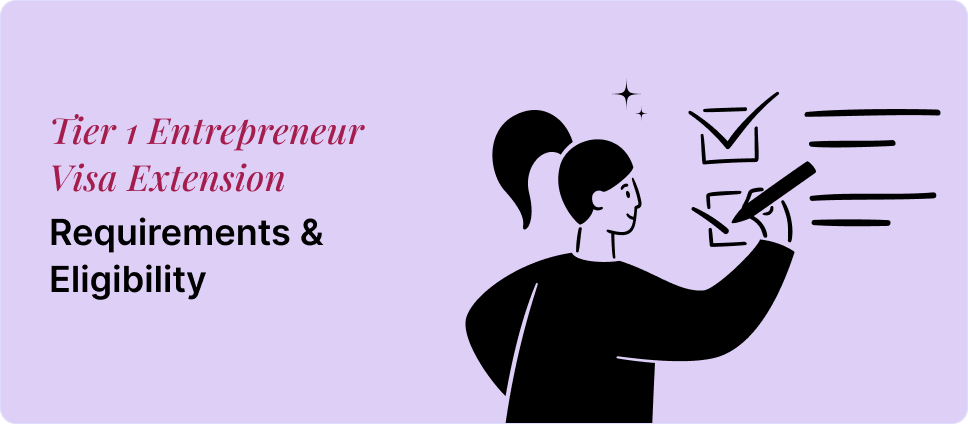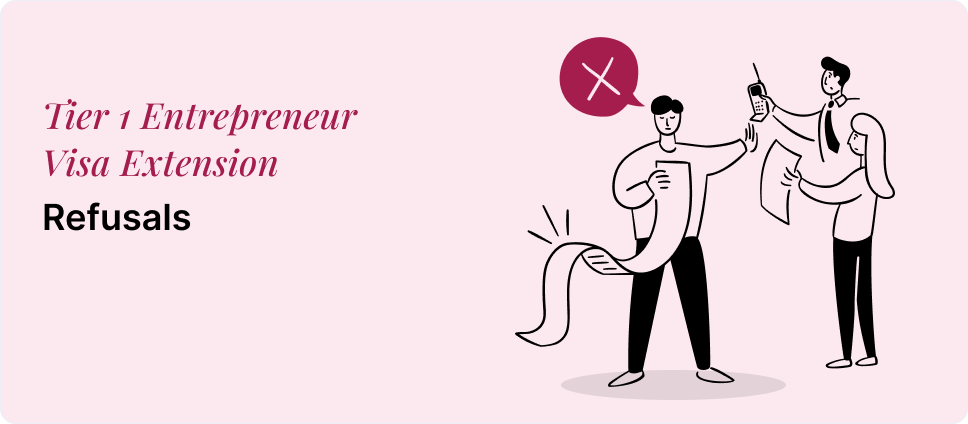Key Takeaways
Only Tier 1 Entrepreneur visa holders who previously held a Tier 1 Graduate Entrepreneur visa can apply for an extension. The deadline is 6 July 2025. All other extension applications are closed (the deadline was 6 April 2023).
Must invest £200k (or £50k as relevant), register with HMRC/Companies House within 6 months, stay active in the business for 3 months, and create two full-time jobs lasting 12+ months.
Apply online before your visa expires. The fee is £1,590 (+ Immigration Health Surcharge), and processing takes up to 8 weeks.
Apply after 5 years or 3 years if the business creates 10+ jobs or earns £5M; Graduate Entrepreneur route holders must apply by 6 July 2027.
Table of contents
What Was the Entrepreneur Visa?
The Tier 1 Entrepreneur visa, which closed to new applicants on 29 March 2019, allowed individuals to set up or join and run a business in the UK with a minimum investment of £200,000.
It was available to solo applicants or teams of up to two people. They could share the investment funds if they applied jointly and referenced each other in their applications and business plans. Each team member had to meet the visa requirements individually.
While new applications are no longer accepted, existing Tier 1 Entrepreneur visa holders may still be eligible to apply for an extension.
Entrepreneur Visa Alternatives
Following the closure of the Tier 1 Entrepreneur visa, several UK immigration routes now serve business founders and entrepreneurs.
Innovator Founder Visa
The primary alternative is the Innovator Founder Visa, aimed at experienced entrepreneurs with innovative, viable and scalable business ideas. Applicants must secure endorsement from an approved UK body and present a viable business plan. There is no fixed investment threshold, but applicants must show access to adequate funds where required. This visa offers a direct route to settlement and permits secondary employment if the applicant remains active in the business.
Self-Sponsorship via the Skilled Worker Visa
Whilst not an official category, exploring Self-Sponsorship via the Skilled Worker Visa can be practical in some specific circumstances. It requires an entrepreneur to set up a UK company, obtain a sponsor licence, and sponsor yourself as an employee. While not a formal visa category, this strategy offers control over your own business and employment in the UK, with the added ability to sponsor family members. It requires detailed planning and strict compliance with sponsorship rules.
UK Expansion Worker Visa
The UK Expansion Worker Visa is suited to senior staff from overseas companies looking to establish a UK branch. It allows eligible employees to set up operations in the UK, provided the parent company does not yet have a trading presence. This visa is time-limited and does not lead directly to settlement unless you switch to another eligible route, such as the Skilled Worker Visa.
Global Talent Visa
The Global Talent Visa offers a flexible route to the UK for individuals with recognised expertise in fields like tech, science, or the arts. It requires endorsement without the need for a job offer or sponsorship. Successful applicants can work, be self-employed, or launch their businesses and may qualify for settlement after three or five years.
Extending an Existing Entrepreneur Visa
Under the current rules, Tier 1 Entrepreneur visa holders who previously held a Tier 1 Graduate Entrepreneur visa must apply for an extension by 6 July 2025. All other Tier 1 Entrepreneur visa holders are no longer eligible to apply for an extension, as the deadline expired on 6 April 2023. Those eligible for Indefinite Leave to Remain should apply as soon as they meet the requirements.
Visa Extensions for Dependents
Dependents can apply for visa extensions alongside the primary visa holder. All dependents should be included in your extension application, including any children who have turned 18 during your stay.
Eligibility Criteria for Entrepreneur Visa Extensions

To qualify for an extension, you must meet the Genuine Entrepreneur test and score 75 points under the Home Office criteria.
Genuine Entrepreneur Test
You must show that:
- You have established, joined, or taken over a genuine UK business.
- You have genuinely operated and invested in the business.
- You intend to continue running that business.
- You are not mainly working outside the business you’ve established or joined.
Points-Based Criteria
To qualify for an extension, you must score 75 points based on investment, business activity, registration, and job creation.
- Investment (20 points):
You must have invested at least £200,000 (or £50,000, if that was the basis of your initial visa) directly into one or more UK businesses. - Business Registration (20 points):
You must have registered with HMRC as self-employed or as a UK company director (or partner in a UK partnership), typically within six months of your original visa grant. - Business Activity (20 points):
You must have been active in the business—either self-employed or as a director/partner—during the three months leading up to your extension application. - Job Creation (15 points):
You must have created at least two full-time jobs for settled workers in the UK. These jobs must have existed for at least 12 months during your most recent grant of leave—or in the 12 months immediately before your application if your leave was shorter.
Required Documentation
_1lyzQ5.png)
When applying to extend your Tier 1 (Entrepreneur) visa, you must provide detailed evidence to show that you meet all the requirements. The documents you need will vary depending on your specific situation, but typically include:
- Business Accounts: Formal accounts prepared by a UK-registered accountant, showing that you’ve invested £200,000 (or £50,000 if applicable) into your business.
- Proof of Registration: Evidence you registered as self-employed with HMRC or as a director or partner in a UK company.
- Job Creation Evidence: Documents proving you've created two full-time jobs for settled workers that have existed for at least 12 months. This may include:
- Copies of employee passports or documents confirming settled status
- Employment contracts
- Payslips
- HMRC tax or PAYE records
- Business Credibility: Supporting documents that show your business is genuine and actively trading, including:
- Filed business accounts
- Business bank statements
- Invoices or contracts
- Marketing material or website links
The Home Office may also request additional documents. As requirements vary, always refer to the latest official Home Office guidance to ensure your application is complete.
Processing Times
The standard processing time for a Tier 1 Entrepreneur Visa extension decision is within 8 weeks. However, complex cases may take longer.
Fees
The cost of applying to extend your Tier 1 (Entrepreneur) visa depends on where you apply from:
- In the UK: £1,590 per applicant
In addition to the application fee, all applicants must pay the Immigration Health Surcharge. This gives you access to the UK’s National Health Service (NHS) during your stay.
How to Apply for an Entrepreneur Visa Extension
_1p5tyg.png)
You must apply for the visa extension before your current visa expires.
Complete the online application form
Fill out the Tier 1 Entrepreneur extension form through the official UKVI website.
Pay the required fees
This includes the application fee and the Immigration Health Surcharge.
Upload your supporting documents
Provide all necessary documentation to prove you meet the visa extension requirements.
Book a UKVCAS appointment
Attend a UK Visa and Citizenship Application Services (UKVCAS) service point to provide your biometric information (fingerprints and photo) unless you can submit your biometric data via the ID Verification app. You can also upload your documents through UKVCAS if preferred.
Stay in the UK while your application is processed
You can continue to run your business, but you must not travel outside the UK, Ireland, the Channel Islands, or the Isle of Man until a decision is made. Leaving the UK while your application is being considered can result in the application being withdrawn.
Applying for ILR After Your Entrepreneur Visa Extension
You must apply for the visa extension before your current visa expires.
Complete the online application form
Fill out the Tier 1 Entrepreneur extension form through the official UKVI website.
Pay the required fees
This includes the application fee and the Immigration Health Surcharge.
Upload your supporting documents
Provide all necessary documentation to prove you meet the visa extension requirements.
Book a UKVCAS appointment
Attend a UK Visa and Citizenship Application Services (UKVCAS) service point to provide your biometric information (fingerprints and photo) unless you can submit your biometric data via the ID Verification app. You can also upload your documents through UKVCAS if preferred.
Stay in the UK while your application is processed
You can continue to run your business, but you must not travel outside the UK, Ireland, the Channel Islands, or the Isle of Man until a decision is made. Leaving the UK while your application is being considered can result in the application being withdrawn.
Applying for ILR After Your Entrepreneur Visa Extension
After successfully extending your Tier 1 Entrepreneur visa, you may become eligible to apply for Indefinite Leave to Remain (ILR) after completing five years of continuous residence in the UK under this route. After three years, you may sometimes qualify for accelerated ILR if your business has created at least ten full-time jobs or generated £5 million in income.
If you previously held a Tier 1 Graduate Entrepreneur visa before switching to the Tier 1 Entrepreneur route, you have until 6 July 2027 to apply for ILR.
Once you have held ILR for at least 12 months, you may then be eligible to apply for British citizenship, subject to meeting the relevant residency and legal requirements.
Common Reasons for Visa Extension Refusal and How to Avoid Them

Applications for Tier 1 Entrepreneur visa extensions can be refused for various reasons. Common issues include:
- Failure to meet the job creation requirement – Not creating two qualifying full-time jobs for settled workers, or the jobs not lasting at least 12 months as required.
- Insufficient investment evidence – Not clearly proving that £200,000 (or £50,000, if applicable) was invested directly into a UK business.
- Lack of credible business activity – The Home Office may refuse applications if they suspect that your business is not genuine, not trading, or lacks clear evidence of ongoing operations.
- Missing or incorrect documentation – Incomplete applications, missing documents, or errors in the evidence provided can all lead to refusal.
- Issues with business registration – Not registering with HMRC or Companies House within the required timeframe can affect your eligibility.
- Poor quality financial records – Unreliable or unclear financial accounts may raise doubts about your business and investment claims.
Get Support With Entrepreneur Visa Extensions
Applying to extend your Tier 1 Entrepreneur visa can be complex, with strict requirements and detailed evidence needed. Our experienced immigration team can guide you through the process, ensuring your application is accurate, complete, and submitted on time.
We help minimise the risk of refusal, saving you time, stress, and unnecessary expense—while giving you the best chance of a successful outcome.